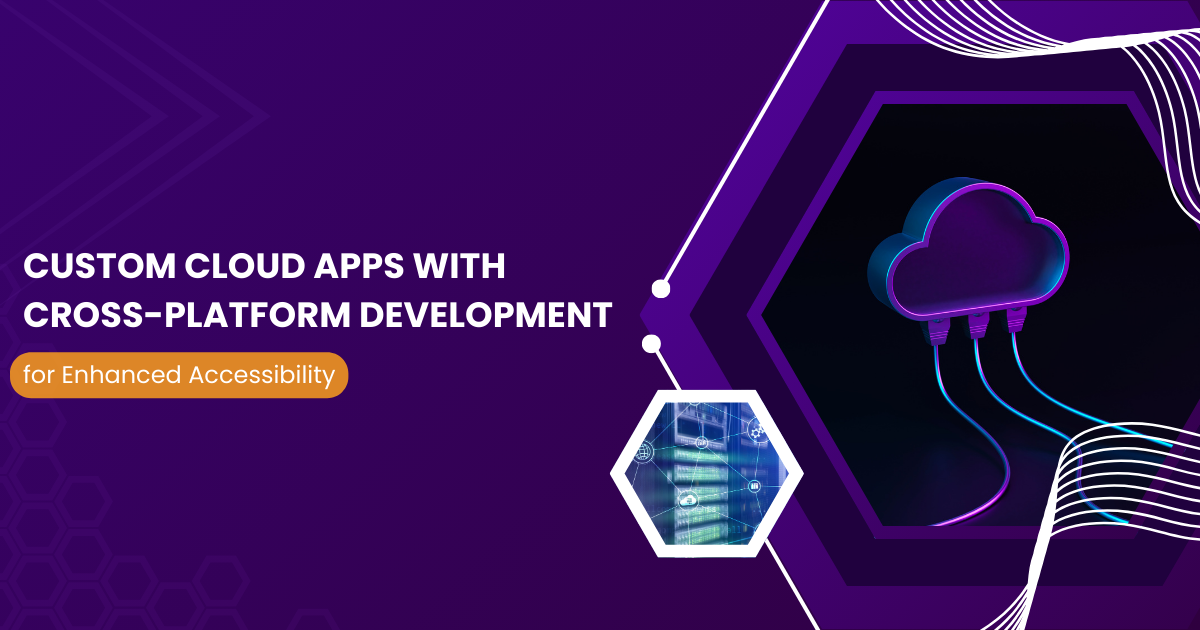Custom Cloud Apps with Cross-Platform Development for Enhanced Accessibility
Did you know that 90% of businesses are now using cloud services, and those that adopt cloud technology can increase their profitability by 20%? Companies must leverage custom cloud applications to stay competitive and agile. Cross-platform development enables the creation of applications that function seamlessly across various operating systems and devices, significantly enhancing accessibility for users.
But why are custom cloud apps essential? They empower businesses to tailor solutions to their specific needs, improving user experience and driving engagement. Furthermore, cross-platform development ensures that your app reaches a broader audience without sacrificing performance or functionality.
In this article, we’ll explore the benefits of custom cloud applications, the importance of cross-platform development, and how businesses can harness these technologies for greater user engagement and operational efficiency.
What Are Custom Cloud Applications?
Custom cloud apps are software solutions designed specifically for a business’s unique needs. These applications are hosted in the cloud, allowing users to access them over the internet from any device. Unlike off-the-shelf solutions, custom apps are tailored to fit the specific workflows, goals, and challenges of an organization.
Custom cloud apps are especially valuable because they are scalable, adaptable, and capable of integrating with other systems, making them a key asset in modern business operations. With the rise of cloud computing, companies are transitioning away from traditional on-premise systems to cloud-based solutions that offer flexibility and real-time accessibility.
The Importance of Cross-Platform Development
Cross-platform development refers to the process of creating applications that can run on multiple platforms—such as Windows, iOS, and Android—without needing to be rewritten for each one. This approach saves both time and resources while ensuring that the app delivers a consistent experience across devices.
In today’s diverse technological landscape, users expect to access services from any device, whether they’re on a smartphone, tablet, or desktop. Cross-platform development meets this demand by providing universal compatibility, which significantly enhances user accessibility.
Benefits of Custom Cloud Apps
Custom cloud apps offer a range of benefits that help businesses stay competitive and efficient. Here are some of the major advantages:
1. Scalability
Cloud apps can grow with your business. Whether you need to add new features or accommodate more users, cloud-based applications can scale efficiently, ensuring you don’t run into limitations as your business expands.
2. Cost Efficiency
Instead of investing in costly infrastructure, custom cloud apps leverage the power of cloud servers. This reduces upfront capital costs, lowers maintenance fees, and provides a pay-as-you-go model for hosting, which is more cost-effective.
3. Real-Time Access
Because these apps are hosted in the cloud, users can access them anytime, from anywhere. This real-time accessibility is crucial for teams that work remotely or in different time zones, enhancing collaboration and productivity.
4. Seamless Integration
Custom cloud apps can integrate seamlessly with other software, making it easier for businesses to manage various processes through a centralized system. This is particularly beneficial for companies with complex workflows or multiple software dependencies.
5. Security
Cloud service providers prioritize security, offering features such as encryption, firewalls, and regular updates to keep your data safe. Custom cloud apps are typically built with additional security protocols to meet the specific needs of the business.
6. Flexibility
Custom cloud apps can be updated and modified easily, allowing businesses to stay agile in a rapidly changing market. Whether it’s adding new functionalities or adapting to new regulations, these apps can evolve without significant disruptions.
Enhanced Accessibility through Cross-Platform Development
One of the key reasons businesses opt for cross-platform development is the enhanced accessibility it offers. Let’s dive deeper into how this happens:
1. Reach a Broader Audience
By developing an app that works on multiple platforms, you can reach users on both Android and iOS, as well as desktop operating systems like Windows and MacOS. This means a broader customer base and more opportunities to engage with potential clients.
2. Consistency Across Devices
When users switch between devices, they expect a consistent experience. Cross-platform development ensures that the app behaves the same way, whether accessed on a mobile phone, tablet, or computer, which enhances user satisfaction and retention.
3. Faster Time to Market
Building a single app that works across platforms reduces the development time compared to building separate native apps for each platform. This allows businesses to launch their products more quickly and respond faster to market changes.
4. Cost Savings
Developing and maintaining multiple versions of an app can be expensive. Cross-platform development reduces these costs by enabling businesses to create a unified app that works on all platforms, lowering development and maintenance costs.
5. Streamlined Updates
With a cross-platform app, updates only need to be implemented once, which simplifies the update process and ensures that all users, regardless of their device, have access to the latest features and security patches.
Cross-Platform Tools for Developing Custom Cloud Apps
Several tools and frameworks make cross-platform development more accessible and efficient. Some of the most popular ones include:
1. React Native
React Native, developed by Facebook, allows developers to build mobile applications using JavaScript and React. It’s highly popular due to its efficiency and the fact that it allows for the creation of both Android and iOS apps using a single codebase.
2. Flutter
Flutter, created by Google, is an open-source UI software development kit used to build natively compiled applications for mobile, web, and desktop from a single codebase. Its hot reload feature allows developers to see the results of changes in real-time, speeding up the development process.
3. Xamarin
Xamarin is a Microsoft-owned framework that allows developers to build native Android, iOS, and Windows apps using .NET and C#. It’s known for its performance and for providing near-native user experiences across platforms.
4. Ionic
Ionic is a framework for building hybrid apps using web technologies like HTML, CSS, and JavaScript. It offers a library of pre-built components, making it easier to create cross-platform applications quickly.
Also Read: Step by Step Guide to Mobile App Development Process
Industries Benefiting from Custom Cloud Apps
While custom cloud apps and cross-platform development are valuable across many industries, certain sectors benefit more significantly from these technologies:
1. Healthcare
Custom cloud apps provide healthcare providers with real-time access to patient records, enabling better communication and care. Cross-platform accessibility ensures that both patients and providers can access these apps from any device.
2. E-Commerce
For e-commerce businesses, custom cloud apps enable seamless online shopping experiences across devices, improving customer satisfaction and driving sales. Cross-platform development ensures these apps work smoothly on both mobile and desktop devices.
3. Education
In the education sector, cloud apps are used for everything from student management systems to e-learning platforms. Cross-platform functionality ensures that students and educators can access these tools from any device, increasing the reach and effectiveness of educational programs.
4. Finance
The financial sector relies heavily on custom cloud apps for tasks like real-time data analytics, portfolio management, and transaction monitoring. Cross-platform apps provide clients and financial professionals with access to these tools from any device, improving efficiency and decision-making.
Challenges of Cross-Platform Development
While cross-platform development offers numerous benefits, it’s not without challenges. Some common obstacles include:
1. Performance Issues
Although cross-platform frameworks are efficient, they may not always match the performance of native apps, especially for resource-intensive applications. Developers need to balance performance optimization with the broader accessibility of the app.
2. Limited Access to Device-Specific Features
Certain device-specific features, such as advanced camera functionalities or gesture controls, may not be as easily accessible through cross-platform development tools. Developers must decide whether to prioritize universal compatibility or native performance.
3. Security Considerations
With cross-platform development, maintaining consistent security across different operating systems can be challenging. Each platform has unique security vulnerabilities, and developers need to ensure robust protection for users across all devices.
How Cloud-Based Application Development Services Help Your Business
Cloud-based application development services provide businesses with tailored software solutions hosted in the cloud, delivering numerous advantages. By partnering with a cloud development service provider, companies can leverage expert resources and cutting-edge technology to create custom applications that meet their specific needs. Here’s how these services can benefit your business:
1. Cost-Effective Development
Cloud-based services eliminate the need for expensive hardware and infrastructure, significantly reducing the costs associated with app development. Service providers offer a scalable pricing model, allowing you to pay for only the resources you need.
2. Scalability and Flexibility
With cloud-based development, your application can easily scale as your business grows. Whether you need more storage, enhanced features, or the ability to support more users, cloud services provide the flexibility to expand without significant downtime or expense.
3. Faster Time to Market
Cloud-based development services allow you to accelerate the development process, as providers have the tools, platforms, and expertise to bring your application to market quickly. Faster delivery means you can start reaping the benefits of your custom app sooner.
4. Global Accessibility
Applications hosted in the cloud can be accessed by users around the world, improving collaboration and increasing your business’s reach. Cloud-based services ensure your application is available 24/7, offering a seamless experience for employees and customers alike.
5. Enhanced Security and Compliance
Reputable cloud service providers implement high-level security measures, such as encryption and regular updates, to protect your business’s sensitive data. They also help ensure that your applications comply with industry standards and regulations.
6. Maintenance and Support
By choosing cloud-based development services, you gain ongoing support and maintenance from the provider. This includes regular updates, troubleshooting, and ensuring that your app continues to perform efficiently.
7. Focus on Core Business Activities
Outsourcing cloud application development allows your internal team to focus on core business activities rather than getting bogged down by complex IT tasks. This enhances productivity and allows your business to concentrate on growth and innovation.
Conclusion
Custom cloud apps coupled with cross-platform development offer businesses a powerful way to enhance accessibility, improve efficiency, and cater to a broader audience. By leveraging cloud technology and building apps that work seamlessly across devices, companies can stay competitive in today’s dynamic marketplace.
Investing in custom cloud applications and cross-platform development is a strategic decision that can drive long-term success. Whether in healthcare, finance, education, or e-commerce, the ability to provide users with a consistent, accessible, and high-performing app experience is a key differentiator in the digital age.






